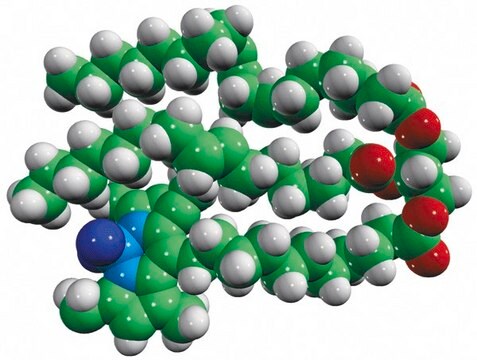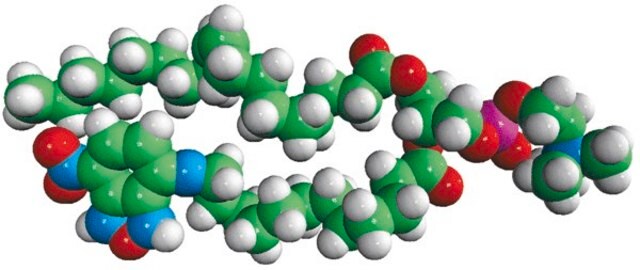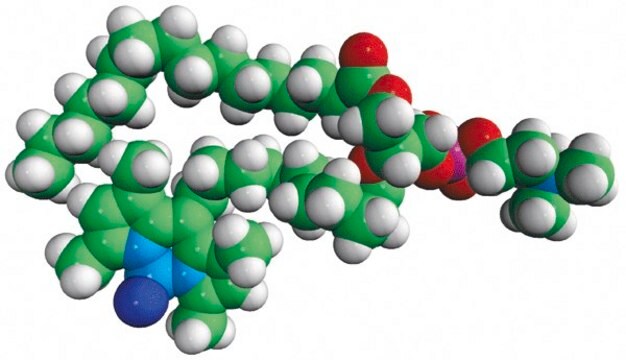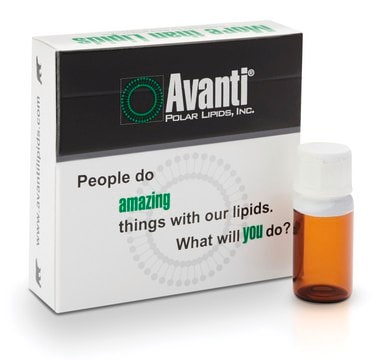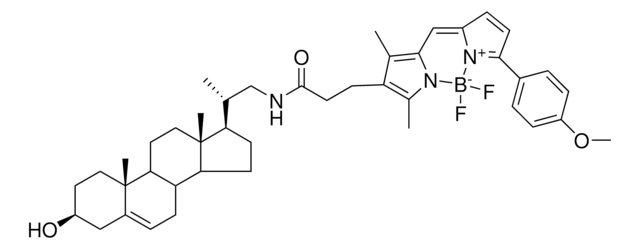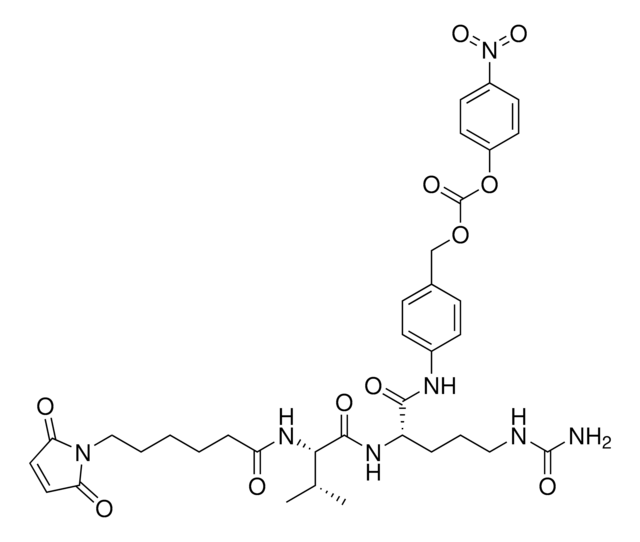810271P
Avanti
18:1-C11 TopFluor™-C11 TopFluor™ TG
Avanti Research™ - A Croda Brand 810271P, powder
Synonym(s):
1-oleoyl-2,3-di[11-(dipyrrometheneboron difluoride)undecanoyl]-rac-glycerol
Sign Into View Organizational & Contract Pricing
All Photos(1)
About This Item
Empirical Formula (Hill Notation):
C69H106 B2F4N4 O6
CAS Number:
Molecular Weight:
1185.22
UNSPSC Code:
12352211
NACRES:
NA.25
Recommended Products
Assay
>99% (TLC)
form
powder
packaging
pkg of 1 × 1 mg (810271P-1mg)
manufacturer/tradename
Avanti Research™ - A Croda Brand 810271P
shipped in
dry ice
storage temp.
−20°C
General description
Lipid droplets (LDs) are organelles that store lipids as reservoirs of metabolic energy and membrane lipid precursors, and they have been identified in the nucleus of some cells. LDs can be found in most eukaryotic cells. Most prominent are LDs in adipocytes, which make up most of the cellular volume, but other metabolically active cell types, such as liver or muscle cells, also have abundant LDs. LDs are unusual organelles in that they are bound by a monolayer of surface phospholipids, into which specific proteins are embedded, such as perilipins and metabolic enzymes. The cell biology of LDs as cellular organelles is only beginning to be unraveled. Avanti now offers a series of fluorescently-labeled mono-, di-, and triglycerides, which are useful for studying these important cellular organelles.
Packaging
5 mL Amber Glass Screw Cap Vial (810271P-1mg)
Legal Information
Avanti Research is a trademark of Avanti Polar Lipids, LLC
TopFluor is a trademark of Avanti Polar Lipids, LLC
Storage Class Code
11 - Combustible Solids
WGK
WGK 3
Choose from one of the most recent versions:
Certificates of Analysis (COA)
Lot/Batch Number
Sorry, we don't have COAs for this product available online at this time.
If you need assistance, please contact Customer Support.
Already Own This Product?
Find documentation for the products that you have recently purchased in the Document Library.
T ap Rees et al.
Symposia of the Society for Experimental Biology, 42, 377-393 (1988-01-01)
The effects of lowering the temperature from 25 degrees C to 2-8 degrees C on carbohydrate metabolism by plant cells are considered. Particular emphasis is placed on the mechanism of cold-induced sweetening in tubers of potato (Solanum tuberosum). Temperatures between
Robert V Farese et al.
The Journal of cell biology, 212(1), 7-8 (2016-01-06)
Lipid droplets (LDs) are sometimes found in the nucleus of some cells. In this issue, Ohsaki et al. (2016. J. Cell Biol. http://dx.doi.org/10.1083/jcb.201507122) show that the nuclear membrane, promyelocytic leukemia bodies, and the protein PML-II play a role in nuclear
Nora Kory et al.
Trends in cell biology, 26(7), 535-546 (2016-03-21)
How proteins specifically localize to the phospholipid monolayer surface of lipid droplets (LDs) is being unraveled. We review here the major known pathways of protein targeting to LDs and suggest a classification framework based on the localization origin for the
Nora Kory et al.
Developmental cell, 34(3), 351-363 (2015-07-28)
Lipid droplets (LDs) are lipid storage organelles that grow or shrink, depending on the availability of metabolic energy. Proteins recruited to LDs mediate many metabolic functions, including phosphatidylcholine and triglyceride synthesis. How the LD protein composition is tuned to the supply
Yuki Ohsaki et al.
The Journal of cell biology, 212(1), 29-38 (2016-01-06)
Lipid droplets (LDs) in the nucleus of hepatocyte-derived cell lines were found to be associated with premyelocytic leukemia (PML) nuclear bodies (NBs) and type I nucleoplasmic reticulum (NR) or the extension of the inner nuclear membrane. Knockdown of PML isoform
Our team of scientists has experience in all areas of research including Life Science, Material Science, Chemical Synthesis, Chromatography, Analytical and many others.
Contact Technical Service